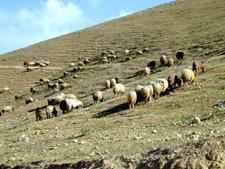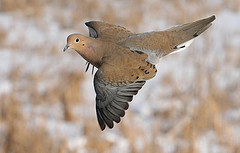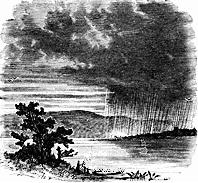dry pastures ♦ the metaphor
Dry Pastures— yes, it is a metaphor.
Dry pastures have their own ecosystem created by low rainfall. Grasses, low scrub, and an occasional lone tree fill a landscape where less hardy plants would struggle to survive, let alone thrive. Spring rains may bring glorious, but short-lived wild flowers. Evolutionists believe they have adapted. Creationists believe it is part of a plan.
I named my blog Dry Pastures because other people and events beyond my control just suck so much of the sparkling water right out of life. “Misunderstood and derided as ‘scrub’ land of ‘underdeveloped’ runts, a dry pastoral land is often home to rare and remarkable flora and fauna.”1
I hope that is what this blog will become— a place to find some unusual and uncommon insights and encouragement for those of us who do not live in the Gardens of Eden.
Welcome to my Dry Pastures.
1. Online Travel Guide for the British Virgin Islands. National Parks Trust. ♦ http://www.b-v-i.com/Nature/Ashore/ashore.htm
Pastures of the Wilderness
21 “Fear not, O land;
be glad and rejoice
for the Lord has done great things!
22 Fear not, you beasts of the field,
for the pastures of the wilderness are green;
the tree bears its fruit;
the fig tree and vine give their full yield.
 23 “Be glad, O children of Zion,
23 “Be glad, O children of Zion,
and rejoice in the Lord your God,
for he has given the early rain for your vindication;
he has poured down for you abundant rain,
the early and the latter rain, as before.
24 “The threshing floors shall be full of grain;
the vats shall overflow with wine and oil.
25 I will restore to you the years
that the swarming locust has eaten,
the hopper, the destroyer, and the cutter,
my great army, which I sent among you.
26 “You shall eat in plenty and be satisfied,
and praise the name of the Lord your God,
who has dealt wondrously with you.
And my people shall never again be put to shame.
Joel 2:21-26 English Standard Version®
The “pastures of the wilderness” in verse 22 is the same word that was used in Psalm 65:12 (July 13). Smith’s Bible Dictionary says: MIDBAR. “the pasture ground.” It is most frequently used for those tracts of waste land which lie beyond the cultivated ground in the immediate neighborhood of the towns and villages of Palestine, and which are a very familiar feature to the traveller in that country.”
Pastures of the wilderness were steep and rocky, unsuitable for growing crops. With ample autumn and spring rains, the land would still be productive as a pastureland for grazing.
Expositor John Gill believed that the verse was offered in a mystic sense and referred “to the great fruitfulness produced in the wilderness of the Gentile world, through the preaching of the Gospel in the times of the Messiah.”
The Desert Shall Rejoice
1 The wilderness and the dry land shall be glad;
the desert shall rejoice and blossom like the autumn crocus;
2 it shall blossom abundantly
and rejoice with joy and singing.
The glory of Lebanon shall be given to it,
the majesty of Carmel and Sharon.
They shall see the glory of the Lord,
the majesty of our God…
4 Say to those who have an anxious heart,
“Be strong; fear not! Behold, your God will come with vengeance,
with the recompense of God.
He will come and save you.”
Isaiah 35:1, 2, 4
This is a continuation of a prophetic poem that was begun in Chapter 34. That chapter covered the bad years and speaks of thorns, nettles and thistles overrunning decaying fortresses. The land has become the haunt of jackals and an abode for ostriches. It speaks of a bestiary of hyenas and wild goats, and of a land possessed by porcupines, owls and ravens.
By Chapter 35, the focus has shifted dramatically. Some commentators have opted to interpret the symbols as primarily spiritual in meaning. Others take it as a more literal prophecy of the millennial age.

Two Crocus Pickers
Glory of Lebanon – The glory of Lebanon was its majestic cedar trees. The wood resists decay and has an aromatic scent. It was often a symbol of strength. Some commentators say that Lebanon denotes the spiritual church, others identify it as the Gentile church.
Majesty of Carmel and Sharon – Carmel was known for beauty: Sharon for the fertility of the land. The commentators who called the glory of Lebanon the spiritual church say that Carmel and Sharon represent the celestial church, or truth revealed. The commentator who identified the glory of Lebanon with the Gentile church believes that Carmel and Sharon are emblematic of the fruitfulness and pasturage of the Gospel.
Clipart credit: Two crocus pickers, eastern wall of upper floor, Xeste 3, Akrotiri, Thera. (Doumas, 1992). ~ for educational purposes
Juniper in the Desert
17 “The afflicted and needy are seeking water, but there is none, And their tongue is parched with thirst;
I, the LORD, will answer them Myself, As the God of Israel I will not forsake them.
18 “I will open rivers on the bare heights and springs in the midst of the valleys;
I will make the wilderness a pool of water And the dry land fountains of water.
19 “I will put the cedar in the wilderness, the acacia and the myrtle and the olive tree;
I will place the juniper in the desert together with the box tree and the cypress,
20 that they may see and recognize, And consider and gain insight as well,
that the hand of the LORD has done this, and the Holy One of Israel has created it.
Isaiah 40:17-20

Even though the literal junipers in the deserts that this passage references would have grown half a world away, far lower in elevation, many centuries removed in time, and were a different species, reading these verses remind me of my visits to the high country of Wyoming. It is a place of juniper in the dessert. The world seems to have more sky there, to be a little closer to heaven. The junipers are tough, drought-tolerant plants with lovely caesious berries.
 [Caesious is an ashy blue color; in botany it can mean “having a waxy bluish-grey coating” such as is sometimes seen on fruits like blueberries and plums. Sometimes the botanical term is spelled without the a, which is a pity because there are not that many words that use all the vowels in order.]
[Caesious is an ashy blue color; in botany it can mean “having a waxy bluish-grey coating” such as is sometimes seen on fruits like blueberries and plums. Sometimes the botanical term is spelled without the a, which is a pity because there are not that many words that use all the vowels in order.]
But getting back on topic, the juniper has been associated with protection. I Kings 19:4, 5 reveals that Elijah sought rest by hiding under a juniper bush when Queen Jezebel was after him. It was there that an angel awoke him and told him to arise and eat. After two meals of angel cakes and another short nap, he “went in the strength of that food forty days and forty nights.”
The Juniper is an evergreen, and the word’s etymology is in the Latin iuniperis, literally “youth-renewing” from iuuenis (young), and parere (to produce). (Ernest Parkin, 2003)
 Some translations call this plant a broom tree. The broom tree is a specific species classified within the juniper genus. These produce white flowers during the late winter rainy season that are said to have a sweet honey-like fragrance. The juniper bushes I am familiar with smell like… juniper. Okay, that may not be too helpful. The scent is somewhat like cedar but a bit sharper and definitely not like a closet!
Some translations call this plant a broom tree. The broom tree is a specific species classified within the juniper genus. These produce white flowers during the late winter rainy season that are said to have a sweet honey-like fragrance. The juniper bushes I am familiar with smell like… juniper. Okay, that may not be too helpful. The scent is somewhat like cedar but a bit sharper and definitely not like a closet!
Both the North American and the Mid-Eastern juniper varieties can survive and carry on vital life processes such as photosynthesis in drought and near drought conditions. The Lord placed the juniper in the desert.
juniper & berries photos — wikimedia
broom tree — Jackie Chambers; Ramon Crater, Negev Desert, Israel
Oh, that I had wings like a dove!
 Oh, that I had wings like a dove! I would fly away and be at rest.
Oh, that I had wings like a dove! I would fly away and be at rest.
I should escape far away and find a refuge in the wilderness.
I would hasten to my sanctuary from the storm and tempest.
Psalm 55:6-8
One of the curious things about this bit of psalmistry is the reversal in the natural order for storytelling. Whereas one usually flees from and goes to, these verses emphasize flight to the wilds first and mention from the windstorm last. Here the focus is first on the goal of reaching a place of rest.
This psalm is attributed to David, and as such, it does have a historical setting. Before he became king, he had times when he escaped to the wilderness for safety from Saul. Many years after he became king, he was on the run again when his own son Absalom rebelled against him.
He did not want the horns of a bull to make a charge. He did not want the strength of an ox for staying the course or the teeth of a lion to tear and devour. He wanted to rest in a place of solitude with God.
Photo credit to the fabulous tinyfishy who swims in the flickr photo stream.
… and satisfy thy soul in drought
…your light will rise like dawn out of the darkness,
And your dusk be like noonday;
The Lord will be your guide continually,
And will satisfy your desire in the scorched places;
He will give you strength of limb;
You will be like a well-watered garden,
Like a spring whose waters never fail.
~Isaiah 58:10b, 11
`
The scorched places evoke images of shimmering heat in the desert, although the most literal translations emphasize aridity and drought more than heat. The concept of desire goes beyond the physical to the depth of soul. Green’s Literal translation renders the beginning of verse 11 as, “And Jehovah shall always guide you, and satisfy your soul in dry places.
The ‘catch’ comes in the preceding verses. This bit of poetic promise is the Then side of an If-Then statement. The If part begins in verse 9 and goes like this: “If you stop making trouble for others, if you stop using cruel words and pointing your finger at others, if you feed those who are hungry and take care of the needs of those who are troubled, then…
Two of the conditions are don’ts and two of the conditions are do’s. In order to survive and thrive in the dry places, one must begin meeting the needs of the afflicted whilst still afflicted by dryness himself.
stock photo::the spring at En Gedi
Has the Rain a Father?
In the opening chapter of the Book of Job, Satan presents a challenge to God. He tells God that the only reason Job reveres God is because God has protected him; that if Job were to lose everything, he would curse God to his Face.
`
God allows the test, and when Job passes with flying colors, Satan says, “Yes, but what about his health?” So a second trial begins.
`
When God comes to talk to Job at the end of Satan’s experiment, He spends most of his discourse revealing Himself as the Creator to give Job a fuller picture of God’s dominion. These verses are a part of that:
`
25 Who has cleft a channel for the flood,
Or a way for the thunderbolt,
26 To bring rain on a land without people,
On a desert without a man in it,
27 To satisfy the waste and desolate land
And to make the seeds of grass to sprout?
~ Job 38:25-27
The last blog post, quoting a portion of Psalm 65, saw God providing for mankind. In these verses, God is taking care of the earth even when there is no man to benefit by it.
Gill puts it this way: Which is uninhabited by men, being so dry and barren; where there is no man to cultivate and water it, as gardens are; and where is no man to receive any advantage by the rain that comes upon it; and yet the Lord sends it for the use of animals that dwell there; which shows his care and providence with respect even to the wild beasts of the earth.
Gill, John. “Commentary on Job 38:26”. “The New John Gill Exposition of the Entire Bible”. 1999.
Keeping the Earth humming along in tune
God provides for mankind by keeping the Earth humming along in tune. This section of Psalm 65 captures both His husbandry and His fecundity.
9You visit the earth and water it;
You greatly enrich it;
the river of God is full of water;
You prepare their grain,
for thus You prepare the earth.
10You water its furrows abundantly,
settling its ridges,
softening it with showers,
and blessing its growth.

11You crown the year with your bounty;
your wagon tracks overflow with abundance.
12 The pastures of the wilderness overflow,
the hills gird themselves with rejoicing.
13 The meadows are clothed with flocks
And the valleys are covered with grain;
They shout for joy, yes, they sing.
~ Psalm 65:9-13
The psalm can be taken apart so that each element is scrutinized. Maybe I will save that for another day. The big picture shows God looking after mankind by preparing and providing a garden.
I may be back to edit this, but for now, feel free to add to my word association game in the comments.
Attributes of God, as shown in this Psalm:
conservation, frugality, providence, thriftiness, land management, vitality
abundancy, fertility, fruitfulness, productivity, prolificacy, industry.
He found him in a desert land
10 “He found him in a desert land,
and in the howling waste of the wilderness;
he encircled him, he cared for him,
he kept him as the apple of his eye.
11 Like an eagle that stirs up its nest,
that flutters over its young,
spreading out its wings, catching them,
bearing them on its pinions,
12 the Lord alone guided him,
no foreign god was with him.
13 He made him ride on the high places of the land,
and he ate the produce of the field,
and he suckled him with honey out of the rock,
and oil out of the flinty rock.
14 Curds from the herd, and milk from the flock,
with fat of lambs,
rams of Bashan and goats,
with the very finest of the wheat—
and you drank foaming wine made from the blood of the grape
Deuteronomy 32:10–14
This is more Poetry by Moses. I am attracted to it because it is about God providing for His own in the “howling waste of wilderness.” In another season of my life, I could have enjoyed getting all wrapped up in deciphering how the poem lined up with the history of the Israelites, and it is somewhat autobiographical on Moses’ part.
But for now, it is just copacetic imagery. I have used the English Standard Version here. In some other translations, the idea of instruction and guidance comes through a little more. Where the ESV says, “he encircled him, he cared for him,” the NEB renders it, “He protected and trained them.” In verse 11 where the eagle “stirs up its nest,” other translations allude to the eagle teaching its young to fly.
It is fitting poetry for my Dry Pastures blog because it begins in a windswept wasteland, rises to the elevations and safety of an aerie, and ends with the finest of nourishment and fecundity.
distill as the dew

1 “Give ear, O heavens, and I will speak,
and let the earth hear the words of my mouth.
2 May my teaching drop as the rain,
my speech distill as the dew,
like gentle rain upon the tender grass,
and like showers upon the herb.
3 For I will proclaim the name of the LORD;
ascribe greatness to our God!
~ Deuteronomy 32
This little bit of Bible poetry speaks of the reviving influences of gentle instruction. Rain may fall at any hour, but dew comes quietly in the night and gives a quality of cleanness to the dawn.
This is the beginning of a Song of Moses. He has called to witness both heaven and earth. It is a song of instruction that is meant to bear fruit, to grow the grass and the herb.
The end of the intro is a call to remember the greatness of God.
